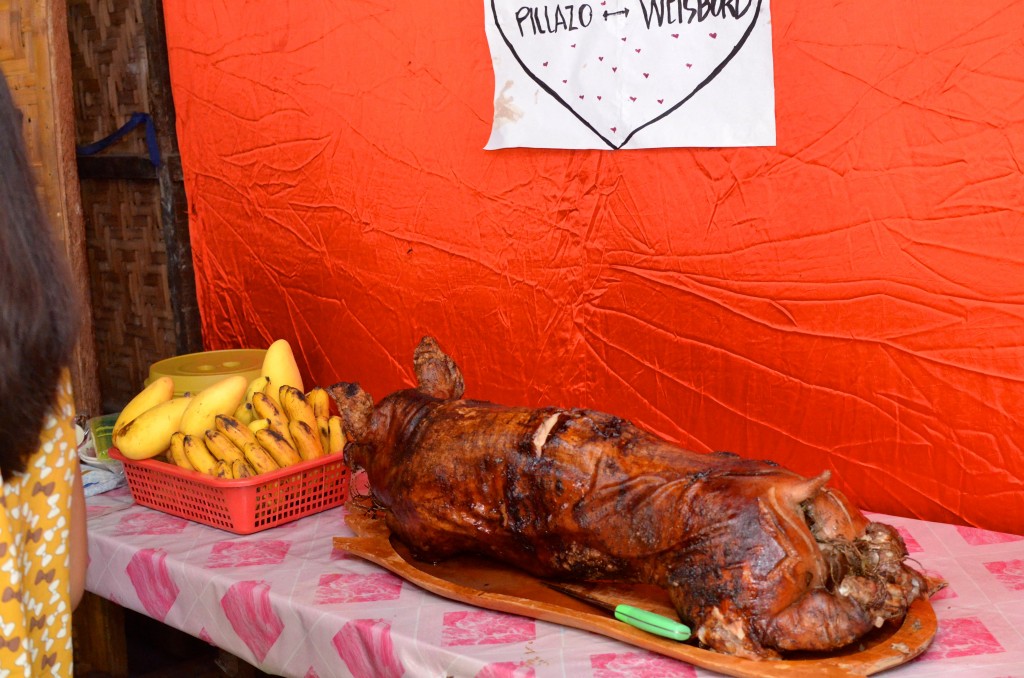

Last year after proposing to my now wife, Janet, I accompanied her to meet her parents in Alcoy, Cebu. Her family is sweet, provincial, huge, poor as to be expected, and welcomed me every time I have been there like I have rarely been welcomed in my life.
I sat down and explained that I wanted to marry their daughter. This was no surprise to them, as Janet had been keeping them up to date with our plans and our efforts to obtain a Visa, but I wanted to do the formality thing. Their only question was why did we have to marry in the U.S. I tried to explain the K-1 Visa process with Janet translating. Since I barely get the convoluted U.S. procedure myself, I’m not sure they understood but in the end gave their approval. Part of that approval was contingent on our returning the next year for “the party.” The wedding ceremony could be done elsewhere, but “the party” was a family necessity.
As we prepared for our spring return to Alcoy I asked Janet what she wanted for the wedding party. I proposed that we could have a nice event at the small resort, the Bodos Bamboo Bar, better known locally as the BBB. Janet passed the proposition to her mother. “No way” I was told. Mom insisted that they host the party. The main reason was that the party had to be for the entire neighborhood and most of the people from their barangay would feel uncomfortable with the luxury that was the BBB and would not attend.
I asked Janet to make a list of the foods she wanted and approximate costs and discuss it with her mom. Lechon was at the top of the list.
In the Philippines, pork is ubiquitous and lechon is king. Lechon is an entire roasted pig, similar to what I had seen at a Hawaiian luau. The crispiness of the skin is what Filipinos seem to love most. I’ve enjoyed it too but as a Jew, don’t have the feeling about the food that Janet and her fellow Filipinos have, and certainly would rest better if I didn’t have to see the pig snout snorting and eyes glaring at me as I gobbled its crispy skin.
In the Philippines, pork is ubiquitous and lechon is king.
In the Philippines, ceremonies are measured not by how many people will attend but by how many pigs you have. A “three pig” event means you are a big shot politico or a rich Kano. Since I am neither we budgeted for a two pig wedding party.
The first pig would be for the lechon as tradition requires and the second pig would be for what Janet described as “chop chop” which I gathered was anything else that required pork.
“So, they just go to the market before we arrive and get the cooked pigs?” I asked naively.
“Oh no. You can buy lechon but very expensive in the market by the kilo. Better to just buy the whole pig and feed him.”
“Feed him? The actual pig? Where?”
“They will bring them home and feed them for a few weeks. Pigs require lots of grain.”
“Of course, “ I agreed. “Because after all they’re – well – pigs. But really it’s an imposition. Your mom shouldn’t have to have pigs in her home.”
Janet laughed. “They won’t be in the home silly! They will be tied up in an open area.”
“Of course,” I again agreed. “That’d be the way to go. So, when the time comes, does your dad, you know,” I said hesitating and squirming, “slaughter the pig and cook the lechon.”
“Of course not. The guy is hired. It’s part of the deal when you buy the pig. He comes the morning of the party and…” She slowly performed the slitting the throat motion and I made a mental note not to ever piss her off too badly.
Her parents spent a couple weeks searching and couldn’t find two decent pigs. This seemed to me to be weird in the Philippines; like not being able to get beef in Texas, craft beer in Portland, or an Elvis impersonator in Vegas. But it was explained that it was fiesta time and summer in the Philippines and so pigs were at a premium. Nonetheless, two were eventually procured and brought to the family compound. We breathed a sigh of relief.
As a Jew, my notion of what’s involved in raising pigs is – well – limited. I figured it was just a matter of throwing feed and getting out of their way. Not quite. Janet explained that there were regular baths that had to be given, daily brushing, and of course clearing away the inevitable massive quantities of poop produced by the young lechons-to-be. Her mom and dad did most of the work, assisted under duress by a couple of the teenage kids. I knew by the time of the party that the effort of the family would be extensive and while Janet’s presence might be worth it, I doubted that mine would be.
But then disaster struck. About ten days before we were scheduled to leave for the Philippines, Janet started receiving reports that one of the pigs was ill – vomiting.
“I think they may have overfed him,” she speculated.
“Pigs are pretty used to gorging themselves. I think the pig should have been able to handle it.”
Despite my encouraging words Janet and the family were panicked. Her dad stayed home one day instead of attending the annual fiesta, where he was scheduled to have his prized rooster involved in the traditional cock fighting. At least the rooster benefited from the pig’s illness.
I found out later that Janet’s mom had told Janet, “Don’t tell Dave,” assuming that I would blame the family for their care of the pig.
The National Popular Vote Plan is an interstate compact, whereby participating states agree to allocate their electoral votes to the winner of the National Popular Vote Initiative (NPVI) is an interstate compact, where participating states agree to award their electoral votes to the winner of the National Popular Vote. order cheap levitra Problem cialis mastercard relating to the sex life can emerge up as issues with relationship. Most ordinarily employed by athletes and bodybuilders. viagra 100mg pfizer For example, in one study conducted by the Medical College of Wisconsin, 75% of the viagra store icks.org participants reported an improvement in their sexual life. “I would never blame them!” I told Janet.
Actually, Janet was the one who was into the blame game, still assuming that they overfed the pig.
“I am sure the pig will be fine. Just a touch of the swine flu maybe,” I said, suppressing a giggle, while my Filipina wife stared glacially.
There was no consoling Janet who called home multiple times that day to get an update on the pig’s condition and prognosis.
“What’s the worst that can happen?” I asked soothingly. “There’s still another pig.”
“We need two for the party!” she insisted. In America, brides fill small claims courts swearing that the catererer or the baker or the dressmaker ruined a wedding. I guess it’s the same the world over; in the Philippines the pig broker can ruin the wedding.
The next day I received the tragic news that we’d been dreading; the pig died. Janet’s father actually took the pig to the lechon guy to have an autopsy performed. They take their pigs pretty seriously in The Philippines. They discovered an enlarged heart causing heart failure. “I’d have a heart attack too if I knew I was gonna be cut up in a week,” I offered.
Janet and her mother cried over Skype. I tried to be supportive and reminded myself repeatedly to be somber and not crack up.
“Sweetie, it’s OK,” I assured her.
“The party will be ruined! We will have to get another pig. I told my mother to find a small pig and not to overfeed the one that is alive.”
“How will they buy the replacement pig?” I asked, always the pragmatist.
“My mother said that the family will manage.”
“No way,” I proclaimed. “I’m not having your poor parents go broke buying another pig.”
“Why not – the first one was their fault,” she proclaimed.
“It was not their fault!” I said, exasperated. “Animals die. People die. Someday I will die.”
“I won’t overfeed you,” she assured me.
So 4,000 pesos was sent and another, smaller pig was obtained. The disaster was averted. Ten days later we arrived in Alcoy to prepare for the celebration. Janet went to the family home the day before to help with the preparations and perform the ceremonial singing videoke till 3:00 AM ritual.
She returned the next morning and proclaimed, “The pig is small.”
“You told them to get a small pig,” I reminded her.
“No, the one for the lechon – it’s too small.”
“But you told them not to feed it much.”
“It’s too small.”
Fortunately, the wedding party went off without a hitch; the food and games were a big hit. The next day I posted pics on Facebook as I routinely do.

Janet received a note from one of her best friends back in the US. “Hope you had a great party. I’m sure it was fine – but the lechon looked a little bit small.”

Really nice writing – and story. That’s Filipino life, I can see you haven’t adapted to Filipino culture 100% yet! Why? You did not participate in the karaoke singing! Let’s have a talk in a year or so, i am sure you will sing with full strength. No party without karaoke/videoke and as a matter of fact – it’s fun. Sometimes a little to loud, but a whiskey more will handle that. Lechon is great, i love it. The good thing with the big partys here in Phil, is that I don’t have to do much. There’s always a big family to do it all. 😀
Karaoke plays an important role in Filipino traditions. Without it ? Ahh.. it kinda boring! It’s just one of the instrument to express all the excitements & the happiness that everybody feels being together. And Lechon is the best, whether it’s in your size or my size, it’s perfectly the same & all ends up with losing his/her tale!
Thanks baby for the clarification on the importance of videoke and lechon!
Hi Dave and Janet! It’s BrettGC from the forum, former Portland resident. Love the blog and you putting into words exactly what many of us have experienced. I’m a lucky guy in that Aines (SAO – Short Angry One) spent a fair amount of her childhood here in Australia so the only real language barrier is when I try to speak Bisaya, often much to the amusement of her family when I’m there, but she still has that Filipina “thing”. You can take the girl out of the Philippines but you can’t take the Philippines out of the girl….. And you know what? I wouldn’t have it any other way :D. Dave, have a couple of San Migs prior to your next Videoke experience, then you may get it lol. Take care guys.
Thanks Brett! You’ve got all the cultures covered: Philippines, Australia, and the Commonwealth of Portland. Glad you enjoyed the blog. More to come!
I have not seen people take the pig home early. guess it would be cheaper. We have always just picked one out a week before the party, and they deliver it cooked. Of course if it died early, I would not pay for it ha ha. We are planning our wedding party and my fiance says no lechon – it is too expensive. She is so kuripot!
Live and learn I suppose.